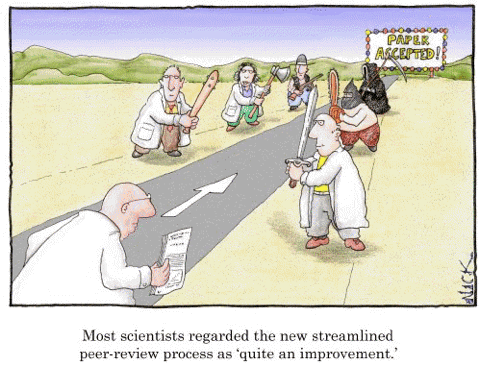Open Access
20/11/13 10:02
I’ve got a thing in the back of my mind now that it is time to change how I submit manuscripts. There is a growing pressure to consider submission of pre-prints, with the most complete arguments I’ve read being made by John Bruno and Jon Wilkins, two scientists I respect for far more than their names. I have little interest in adding another step to the process of making my science publicly known via publishing. However, there are some factors where pre-publication, in appropriate online archives including PeerJ and bioRxiv, certainly makes sense.
The cost of publishing science has never been negligible, but now that we are asked (and it makes sense) to publish in open-access journals so that all citizens of the nations that fund our work can read it, we are often faced with $1500-2000 fees to publish in permanent ways on online servers. However, some (not all) journals will allow you to publish after submitting a version of a manuscript to a pre-print server, and then will allow you to archive the final version on that publicly-accessible server after a short period of time. This could cut the cost of open access considerably.
It also makes sense to me that this could be a ripe opportunity to gain additional input into appropriate analysis and interpretation of data, beyond the typical friendly peer review we all go through. I’m skeptical on this point, as I don’t think my publications on open access journals such as PLoS ONE have garnered much comment in the years they have been up. However, it is possible.
The question will be, and I will test the waters soon, what is requested or required for submission? It doesn’t have to go through peer review, but what formatting and other steps are necessary? How many of these steps are ultimately necessary for publication anyway (and thus just egg along the process)?
The other problem of course is the potential for further dilution of what is branded ‘peer-reviewed’ science. John Bruno, linked above, makes some good arguments that the peer-review system is deeply flawed, and it is. However, it is the only gatekeeper we have when those that are trying to sow doubt about evolution and climate change attempt to fraudulently influence the public understanding. A difficult tension between the two goals: widespread dissemination, and authority. Hmmmm.

The cost of publishing science has never been negligible, but now that we are asked (and it makes sense) to publish in open-access journals so that all citizens of the nations that fund our work can read it, we are often faced with $1500-2000 fees to publish in permanent ways on online servers. However, some (not all) journals will allow you to publish after submitting a version of a manuscript to a pre-print server, and then will allow you to archive the final version on that publicly-accessible server after a short period of time. This could cut the cost of open access considerably.
It also makes sense to me that this could be a ripe opportunity to gain additional input into appropriate analysis and interpretation of data, beyond the typical friendly peer review we all go through. I’m skeptical on this point, as I don’t think my publications on open access journals such as PLoS ONE have garnered much comment in the years they have been up. However, it is possible.
The question will be, and I will test the waters soon, what is requested or required for submission? It doesn’t have to go through peer review, but what formatting and other steps are necessary? How many of these steps are ultimately necessary for publication anyway (and thus just egg along the process)?
The other problem of course is the potential for further dilution of what is branded ‘peer-reviewed’ science. John Bruno, linked above, makes some good arguments that the peer-review system is deeply flawed, and it is. However, it is the only gatekeeper we have when those that are trying to sow doubt about evolution and climate change attempt to fraudulently influence the public understanding. A difficult tension between the two goals: widespread dissemination, and authority. Hmmmm.
